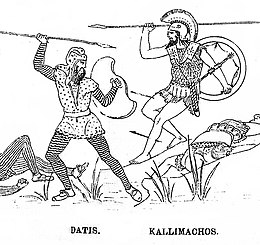Datis
Datis | |
|---|---|
 | |
| Native name | *Dātiya- |
| Born | Media, Achaemenid Empire |
| Allegiance | Achaemenid Empire |
| Battles/wars | Ionian Revolt |
Datis or Datus (
Biography
Before the
Datis and another officer named Artaphernes replaced a commander named
In 490 BCE, Datis sailed from the Ionian shoreline to Samos, and then he travelled through the Icarian sea to the islands of Delos and Naxos.[3] When Datis arrived the inhabitants of the islands fled. Datis then sent the inhabitants a message telling them he did not seek to harm them. Datis burnt large amounts of incense at the altar of Apollo.[4]
Datis's forces travelled along the Greek coast taking town after town. One town named Carystus resisted Datis. So his army of 80,000 soldiers and 200 triremes lay siege to the city. He began the siege by destroying the crops around the city. Eventually, the city was overwhelmed and surrendered.[4][5]
During Datis's siege of Eretria in 490 BCE, the Eretrians had many conflicting strategies. Some Eretrians wished to surrender the city and wage guerrilla warfare in the mountains of Greece. Some Eretrians wanted to surrender the city to the Persians. Four thousand Athenian colonists arrived from Chalcis to help defend Eretria. Datis attacked the Eretrians in battle, resulting in high numbers of casualties. On the seventh day of the siege the Eretrians surrendered, and all of the temples in the city were burned to exact revenge for the earlier burning of Sardis by the Greeks.[4] It is very likely one of the temples destroyed was the temple of Apollo Daphnephoros.[6]
Datis commanded the Persian assault force against the Athenians at the
Family
Datis had two sons named Harmamithres and Tithaeus. Both of his children became cavalry officers and served under Xerxes I.[8]
References
- ^ a b "Welcome to Encyclopaedia Iranica".
- ISBN 978-113-588-209-9.
- ISBN 978-147-282-573-5.
- ^ JSTOR 10.1525/j.ctt14btg30.
- ISBN 978-160-384-679-0.
- ISBN 978-142-142-195-7.
- ^ Photius the Great, Excerpts of Ctesias' "Persica", Paragraph 22, available online at https://www.livius.org/ct-cz/ctesias/photius_persica.html Archived 2016-11-23 at the Wayback Machine
- ^ a b Herodotus, Histories
External links
- Livius.org: Datis Archived 2014-10-09 at the Wayback Machine
